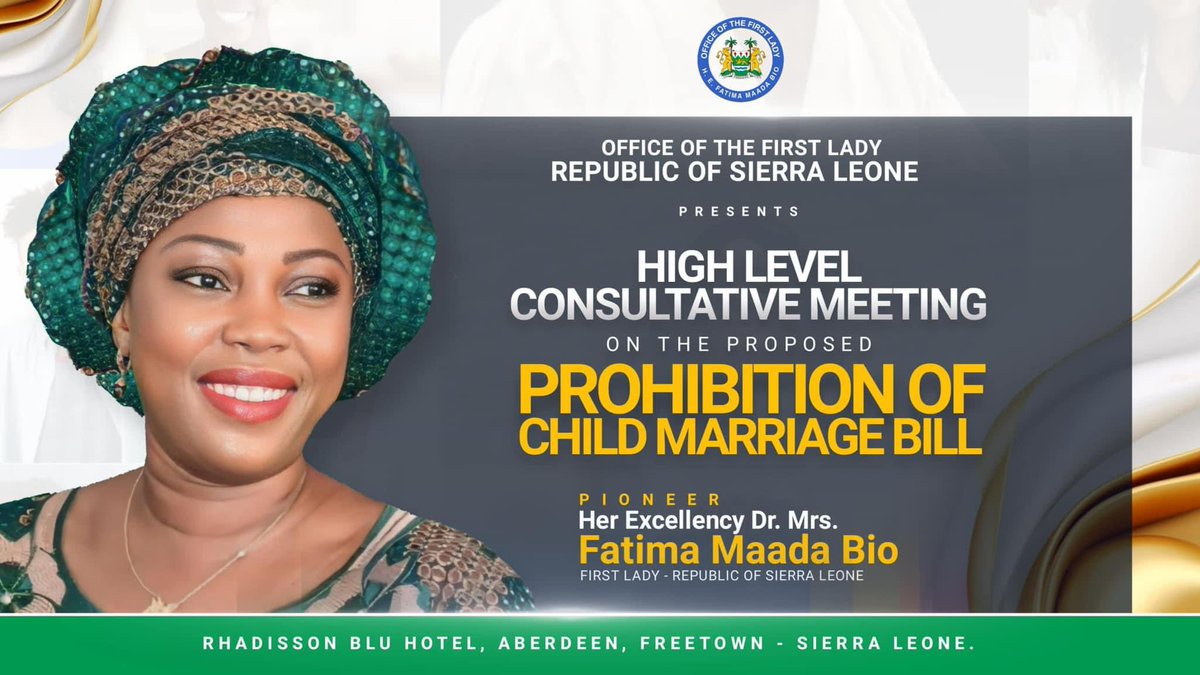INTRODUCTION
The legal framework governing the dissolution and annulment of marriages in Sierra Leone remains largely untouched since the enactment of the Matrimonial Causes Act in 1960. This statute, along with its associated Matrimonial Causes Rules (Chapters 102 and 7 of the Laws of Sierra Leone), continues to dictate the legal pathways for Christian and civil marriages despite its apparent incompatibility with contemporary realities. Across the world, matrimonial laws have undergone significant reform to promote gender equality and acknowledge the changing nature of marriage, yet Sierra Leone’s legal framework still reflects a system that favours patriarchal traditions.
The Matrimonial Causes Act has outlived its relevance and requires urgent legislative intervention. Several provisions in the Matrimonial Causes Act reinforce gender bias, impose financial burdens unfairly, and fail to account for technological changes that have redefined relationships and infidelity. This article examines these shortcomings and makes the case for urgent legislative reform.
STRUCTURAL BIASES IN THE MATRIMONIAL CAUSES ACT
One of the most glaring deficiencies in the Matrimonial Causes Act is its perpetuation of legal standards that systematically disadvantage women while reinforcing outdated notions of male authority in marriage. Three provisions stand out in this regard.
A One-Sided Nullity Provision
Section 3(1)(c) of the Matrimonial Causes Act states that a marriage is voidable:
“(c) that the respondent was at the time of the marriage pregnant by some person other than the petitioner.”
This provision grants a husband the right to annul a marriage if he discovers that his wife was pregnant by another man at the time of their union. However, it does not grant a wife the same right if she later learns that another woman was pregnant by her husband before the marriage.
This disparity reflects an outdated assumption that a woman’s chastity before marriage is more significant than a man’s sexual conduct. Such an imbalance has no place in modern law, where equality between spouses should be the standard.
Gender Disparities in Divorce Grounds
The Act further institutionalises gender bias in Section 5(c), which grants a wife the right to petition for divorce if her husband is guilty of rape, sodomy, or bestiality. While such a provision may appear progressive on the surface, it is problematic because it does not provide the same right to a husband in the event that his wife engages in comparable acts of sexual misconduct.
In a legal system that purports to treat all parties equally and has adopted a GEWE policy and enacted a GEWE law, the ability to seek divorce on moral grounds should not be determined by gender. If a woman has the right to divorce her husband based on these offences, a man should be granted the same right if his wife is guilty of similar acts.
Unequal Burdens in Adultery-Based Divorce Petitions
The Matrimonial Causes Act imposes a disproportionate procedural burden on husbands seeking divorce on the grounds of adultery. Section 6 mandates that a husband filing for divorce on these grounds must include the alleged adulterer as a co-respondent unless excused by the court. A wife, by contrast, does not have full discretion as to whether the alleged adulteress is named as a co-respondent. The legal reasoning behind this imbalance remains unclear and necessitates revision to ensure procedural equity in matrimonial disputes.
FINANCIAL OBLIGATIONS: AN OBSOLETE MODEL
Another key deficiency in the Act concerns post-divorce financial obligations. Section 21 provides courts with discretion to order a husband to pay alimony to his former wife but contains no parallel provision requiring financial support from a wife to her husband.
This provision assumes that men are always the primary earners in a marriage and that women require financial support after divorce. However, this is no longer the reality in many households. Women today are often the primary or co-breadwinners, and some men are financially dependent on their wives.
A fair legal system should base financial obligations on the economic situation of both parties rather than on outdated gender roles. If a former wife is financially better off than her ex-husband, she should be just as responsible for providing support as a former husband would be in a reversed situation.
ADULTERY AND TECHNOLOGICAL EVOLUTION
One of the most striking gaps in the Matrimonial Causes Act is its failure to define adultery. The Oxford Dictionary of Law (5th Edition) defines adultery as:
“an act of sexual intercourse between a male and female not married to each other, when at least one of them is married to someone else.”
This definition, which was adopted by Gooding J. in Ismaila Sahid v. Aminata Sahid (Nee Bah) (2017), fails to accommodate the technological realities of modern relationships.
Several critical questions arise in this regard, does the use of sex toys in a manner that undermines the marital relationship constitute adultery? Can intimate digital communications, including explicit virtual interactions, amount to infidelity? and should sexual activities that do not involve traditional intercourse but nonetheless breach marital trust be classified as adultery?
These questions remain unaddressed in Sierra Leonean jurisprudence, leaving a significant legal vacuum. Without a revised statutory definition, courts are left to interpret adultery based on outdated precedents that fail to reflect contemporary realities.
Urgent reform needed
The current legal framework must be revised to eliminate gender biases and ensure equal protection under the law. Key reforms should include both spouses should have the right to annul a marriage based on concealed pregnancy by a third party, grounds for divorce should apply uniformly to both husbands and wives and the requirement to name co-respondents in adultery-based divorce petitions should be gender-neutral.
The revised Act must abandon rigid gender presumptions regarding post-divorce financial obligations. Courts should determine alimony based on financial capacity rather than outdated notions of male economic dominance.
The definition of adultery should be expanded to include explicit virtual interactions and sustained emotional affairs that undermine marital trust should be recognised as adultery and the use of sex toys in a manner that constitutes betrayal of marital fidelity should fall within the ambit of adultery.
CONCLUSION
The Matrimonial Causes Act remains entrenched in outdated gender norms and fails to address critical developments in marriage, sexuality, and technology. Reforming this statute is not merely a matter of legal modernisation—it is an urgent imperative to uphold principles of equality, fairness, and justice in matrimonial law. Redefining adultery, and ensuring economic fairness in divorce proceedings by adopting gender-neutral standards, Sierra Leone can align its matrimonial laws with contemporary realities and international human rights norms.
The time for legislative action is long overdue.
Hassan Conteh is a legal Practitioner with the Law firm of Michael and Michael and works with @ILARJ2







